Oxford and Cambridge are said to be illegally spying on students for money
Universities are not benevolent institutions that exist only to nurture and enlighten young minds. They’re also cash-hungry corporations eager to eke money out of the students they graduate—a mission made clearer by recent revelations about Oxford and Cambridge.


Universities are not benevolent institutions that exist only to nurture and enlighten young minds. They’re also cash-hungry corporations eager to eke money out of the students they graduate—a mission made clearer by recent revelations about Oxford and Cambridge.
The two schools—along with the two dozen other universities in the UK’s Russell Group, an association of public research universities that includes University College London and the London School of Economics—are under UK government scrutiny for spying on graduates to boost donations in fundraising drives. According to an investigation from the Daily Mail, the 24 schools illegally hired wealth-screening firms to keep track of students’ salaries, investments, pensions, home values, and friendships without their permission, all to determine which alumni would be likely to donate the most. Details include:
- Oxford assessing the “estimated wealth band” on 199,369 alumni records;
- Cambridge sending 301,769 alumni records to wealth-screening companies such as one called “Prospecting for Gold”;
- the University of Manchester performing “demographic coding” on graduates, categorizing them by class;
- the University of Sheffield identifying “retired residents in sizable homes whose finances are secured by significant assets and generous pensions”;
- several schools highlighting alumni who are likely to include them in their wills.
“Personal data belongs to the individual and that means they have the right to make choices about how it’s used,” said Elizabeth Denham, head of the information commissioner’s office, which is looking into the Daily Mail’s investigations for the UK’s education department, according to the UK’s Telegraph. The Russell Group released the information to the Daily Mail under the Freedom of Information Act, despite campaigning previously to be exempted. In response to the new report, a spokesperson from the Russell Group told the Telegraph that the organization takes alumni privacy “very seriously.”
That colleges spy on their students isn’t new: Most applicants these days understand that their social media accounts are stalked by admissions counselors. But the depth of tracking that universities do—from a student’s application submission as a teenager, until their death—is perhaps less known than it ought to be.